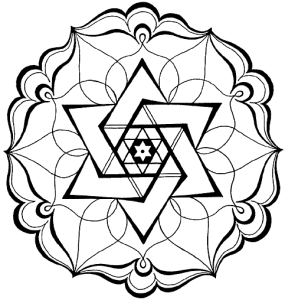I don’t believe in karma. I don’t believe that our actions in this life dictate the quality of the rest of our lives or what happens in the next life, and I don’t believe that what happened in a past life is responsible for what this life has in store for me. I believe that our thoughts, actions and words contribute to the world around us, and to not be mindful of the energy we emanate is irresponsible. I believe that we are meant to fuck up to then see the error on our ways and learn from it. I also believe that our responsibility in this life is to be as authentic as possible, especially when that authenticity’s expression is diametrically opposed to popular opinion.
I believe in a healthy dose of doubt. Doubt can be an absolute killer, or it can be the road to salvation, truth and knowledge. I believe that questioning is necessary, that to take what others present as being true is to totally and irrefutably give away your personal power and the opportunity to expand your knowledge of your own unique truth. Truth is subjective, and we all have different understandings of what is true based on our own sentient experiences. To adopt another’s concept of truth blindly is to abandon one’s own journey towards becoming an awakened soul, aware of itself by experiencing everything that is its specifically to live, learn from and which contributes to its expansion of awareness.
I only believe in what I know to be true on a level where words somehow minimize the knowing. There’s a difference between not knowing something and being unsure of it, and feeling a deep-rooted sense of doubt. I believe that visceral doubt is way more a pure expression of the energy that animates my body than the adoption of a concept like karma that keeps us adhering to laws that may not resonate entirely but to which we attach for fear of getting it wrong and suffering the consequences.
You know what lands well with you and what doesn’t. You know what lies in the space between what you say you believe and what lands in your body and your soul as being true. You may KNOW karma as reality because every fiber of your being tells you this is so, and so your truth is unwaveringly yours to live. But if you somehow don’t align with its principles but adhere to them anyways, you’re living outside of your truth, and I know, viscerally, that our purpose in life is to abide in that which resonates undeniably within us. It’s for this exact reason why certain principles from the Ashtanga Yoga System seem completely unrealistic and impractical to me, while certain principles from Tantra and Kashmir Shaivism ring true. On an energy level.
I use karma as an example, but we blindly ally our beliefs to ideas and regulations that ring absolutely untrue to us.
And so…ask yourself…how are you giving your personal power over to dogma and doctrines that you know you don’t agree with? What risk would you run of detaching from them and being inwardly and outwardly honest about what you truly believe?

Well said.The more aware i become the less I believe in the rules of society.
Right!The SOUL has no karma,the EGO make karma that is perpetuated in behaviours and beliefs trough generations.
I like this post Bram, I am often surprised at the socially accepted mean-spiritedness of some people who, when learning of someone else’s misfortune, will smugly assure themselves and others “that’s karma for ya!” Ideas of revenge, resentment, justice, redemption, compensation, expiation seem almost irretrievably woven into the fabric of the human desire for stability and order in a multiverse of overwhelming fluidity and change. That said, karma as a concept can be an interesting frame through which we can consider accreted bodies, identities, or larger systems such as the irreducibly complex and decadent civilization in which we participate.